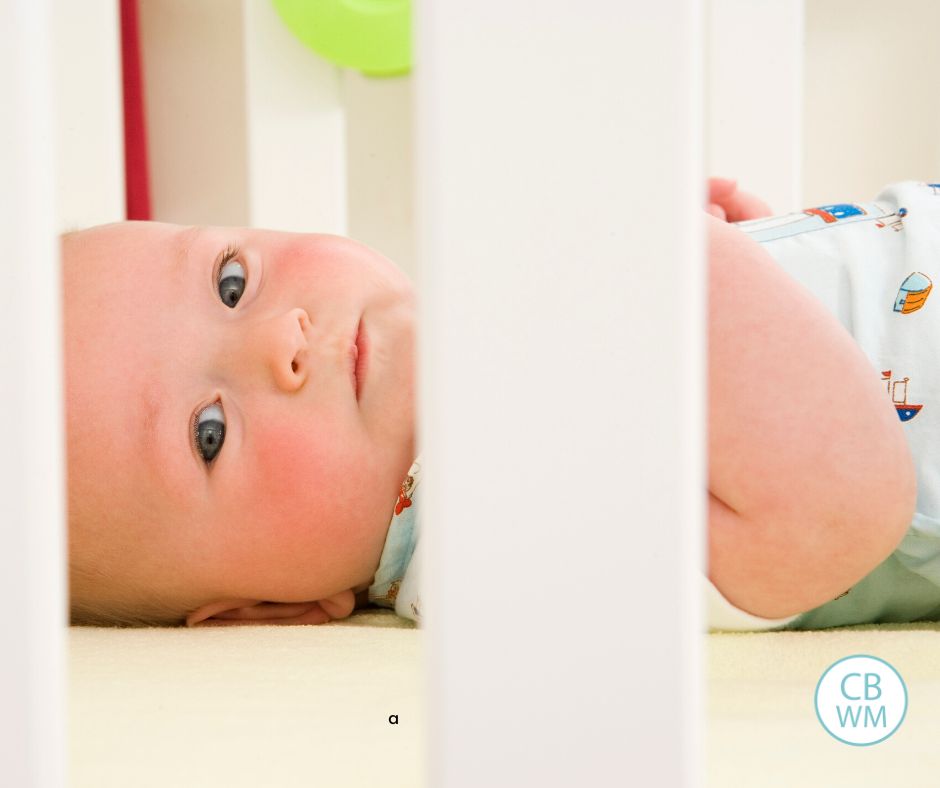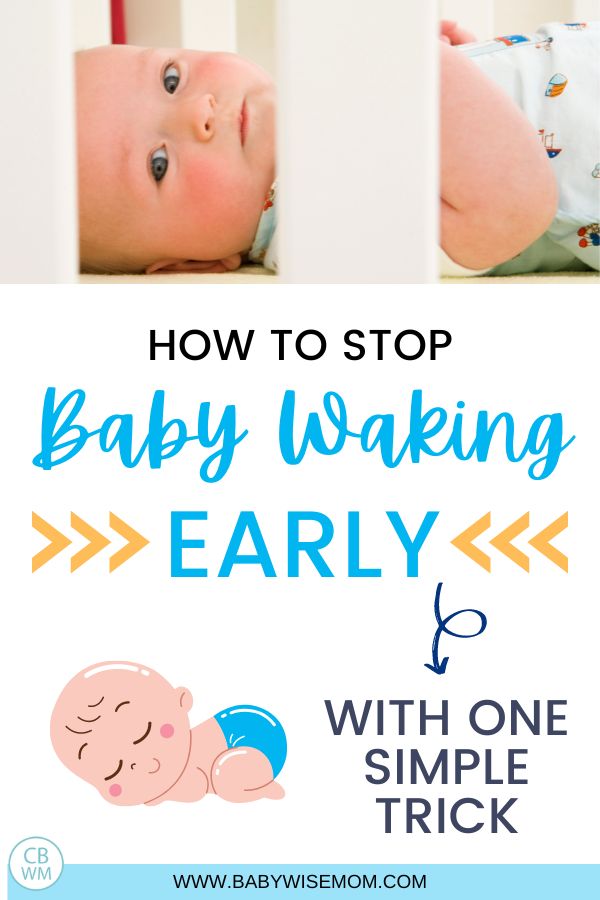Use this simple trick to get your baby to go back to sleep when waking early from a nap. Find out why this works as well as reasons babies often wake early from naps. Learn alternative methods to helping baby fall back asleep after waking early.

When my first child was a baby, I would rush to him when he woke early from a nap. I really did not want him to fully wake up and be hard to possibly get to go back to sleep.
Little did I realize that was the wrong thing to do.
When my second child came along, it didn’t take long for there to be a day that my newborn woke earlier than I expected from her nap. My 22 month old was in the bath, so I had to take the time to get him out of the tub, dried, and dressed before I could attend to my newborn.
By the time I was done getting him out of the bathtub, my newborn was back asleep.
Back asleep!
This got me thinking and experimenting.
Post Contents
Wait 10 Minutes Before Responding When Baby Wakes Early
When your baby wakes early from a nap, one of the best responses you can have is to wait 10 minutes before going in to your baby.
Waiting 10 minutes gives your baby a chance to resettle and go back to sleep. Your baby will do this independently, which will help your baby to develop independent sleep skills.
It is really that simple.
This method can work for middle of the night wakings as well as early morning wakings, also.
Simply wait 10 minutes.
Caveats
Of course there are caveats.
If you can tell something is really wrong and your baby needs immediate attention, respond immediately.
If you can tell your baby is in pain, respond as fast as you can.
If your baby is hungry, you also want to respond right away.
Otherwise, wait that 10 minutes before going in.
Understanding Sleep Transitions
A sleep transition happens every 45 minutes while your baby sleeps. This is when your baby moves from one type of sleep cycle to another type of sleep cycle.
Some babies will be noisy when going through a sleep transition. Some are still asleep but fussing or even crying as they transition.
Others are awake, but still quite groggy and sleepy.
If you step in, you help bring baby to be fully awake and alert.
If you wait 10 minutes, however, you give your baby the chance to fall back asleep and into that next type of sleep cycle.
>>>Read: What is a Sleep Transition (and How Does It Impact Naps)
What Does Waking Early Look Like
You might not be sure how long of a nap is a “full nap” and how long of a nap is a “short nap”.
Babies of all ages should typically have a nap that lasts 1.5-2.5 hours long. The last nap of the day can be only 30-60 minutes long.
Once your baby moves to only 2 naps a day (6 months or older), those two naps will still be 1.5-2.5 hours long each.
Reasons Babies Wake Early from Naps
If your baby is frequently waking around 45-60 minutes into a nap, you will want to address and solve the short naps. Some common reasons include:
- Hunger or Growth Spurt
- Baby Unable to Sleep Independently
- Sleep Regression
- Habit
- Wake Time Length is Wrong (also known as wake windows)
- New Skills
I have many posts that will help you fix these short naps. Be sure to read these for help:
- How to Finally Stop the 45 Minute Intruder
- Sleep Regressions: Causes, Ages, and What to Do
- The Complete Guide to Troubleshooting Short Baby Naps
You can also sign up for my FREE email series that helps you solve baby’s short naps.
Other Options for Helping Baby Go Back to Sleep
You might feel uncomfortable with waiting 10 minutes to see if baby will go back to sleep. You might also feel fine with it, but wonder what to do if baby does not fall back asleep in that 10 minute window. Here are some options for you.
Sleep Training
If you sleep train your baby, your baby will develop the skills necessary to be able to fall asleep independently. This will mean that when that sleep transition happens at 45 minutes, your baby will move between sleep cycles without crying.
Gentle Sleep Training: The Four S’s is my favorite no-cry sleep training method. You use it in the newborn months, so it works for young babies!
You can also use various forms of Cry It Out (CIO) sleep training.
Resettle Baby
You can also resettle your baby and get your baby to fall back asleep with your help. Be forwarned that if you resettle baby or use sleep props to resettle baby, your baby will need your help for a longer period of time.
You can help resettle your baby until you feel comfortable with some form of sleep training. You can also hope that your baby will eventually stop needing your help mid-nap to resettle. While there are a small number of babies who will do this on their own, most will not.
You can rock your baby back to sleep, put baby in a swing, put your baby in a carrier, or do a contact nap where you hold baby until it is time to get up.
>>>Read: How to Put Baby Back to Sleep
Conclusion
Waiting 10 minutes before you get baby up from a nap when she wakes early is a very simple way to allow your baby to learn to be an independent sleeper. It helps you avoid developing habits you will have to break later.
It will help your baby take solid naps and start as you mean to go on. We are aiming for long-term gains, not short-term solutions. Waiting 10 minutes helps you meet your long-term sleep goals.
Related Posts
- Baby Waking Shortly After Bedtime: What To Do
- 11 Reasons Your 5-8 Month Old Stopped Sleeping Well
- How To Get Baby to Sleep Through the Night
- An Easy Short Nap Fix that Works
- How to Calculate Waketime When Baby Wakes Early

